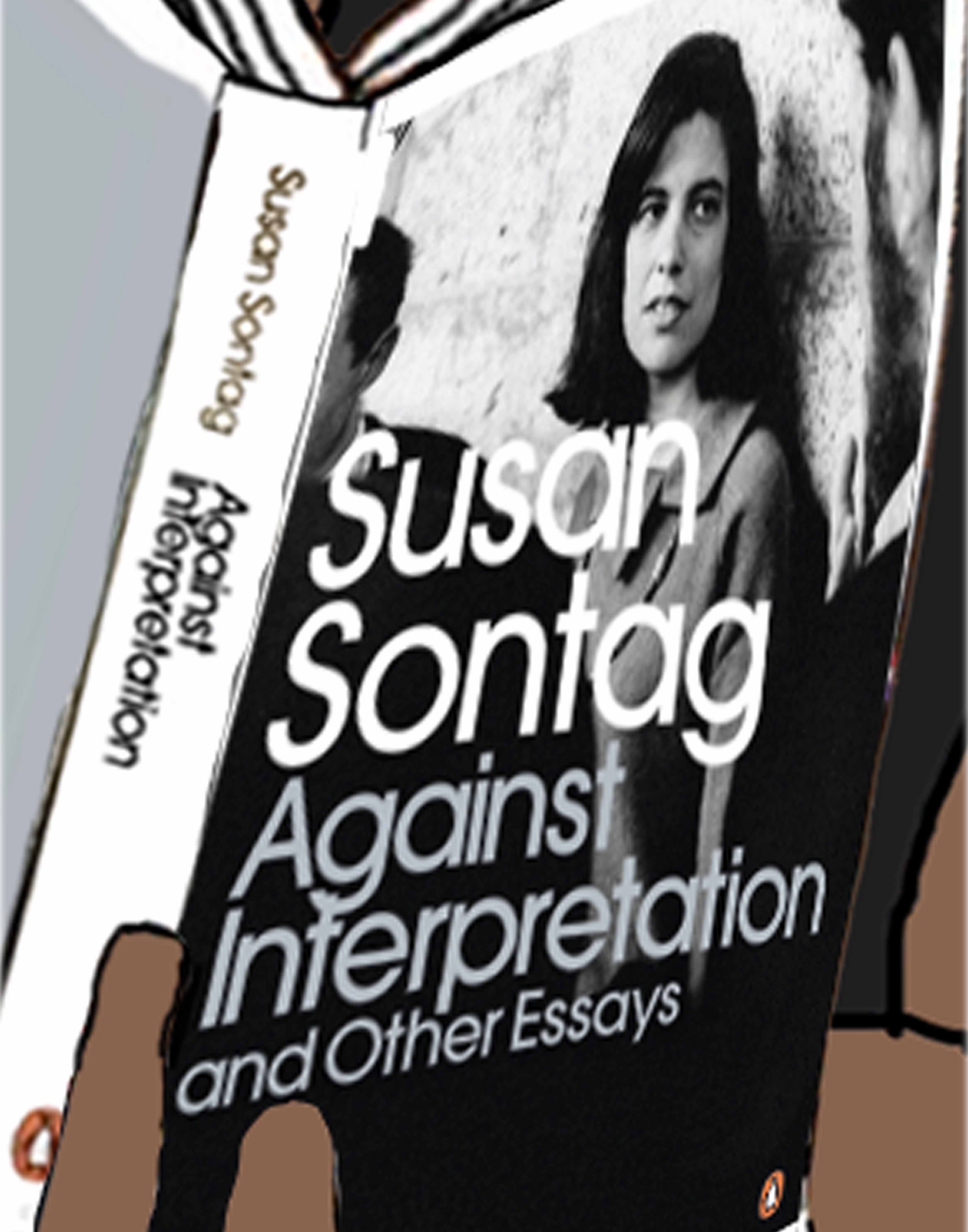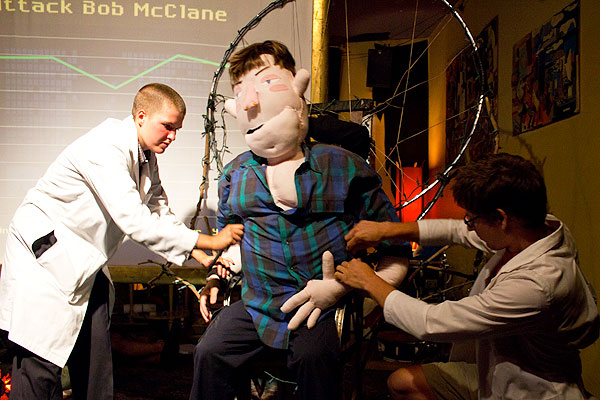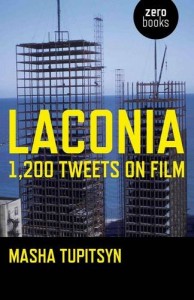A bit more on Susan Sontag and “Against Interpretation”
I’m still bogged down with school (almost done) but I thought I’d throw a little something up, pun intended. Two months ago I wrote an analysis of Susan Sontag’s “Against Interpretation” where I argued that, rather than being opposed to all interpretation, as some believe, Sontag was instead opposed to “metaphorical interpretation”—to critics who interpret artworks metaphorically or allegorically. (“When the artist did X, she really meant Y.”) I thought I’d document a few recent examples of this—not to pick on any particular critics, mind you, but rather to foster some discussion of what this criticism looks like and why critics do it (because critics seem to love doing it).
The first example comes from Chicago’s Museum of Contemporary Art, in particular the exhibit “Destroy the Picture: Painting the Void, 1949–1962” (which is up until 2 June). One of the works on display is Gérard Deschamps’s Tôle irisée de réacteur d’avion (pictured above, image taken from here—I didn’t just stretch out a swath of tinfoil on my apartment floor). The placard next to it reads as follows:
25 Points: Susan Sontag’s “Against Interpretation”
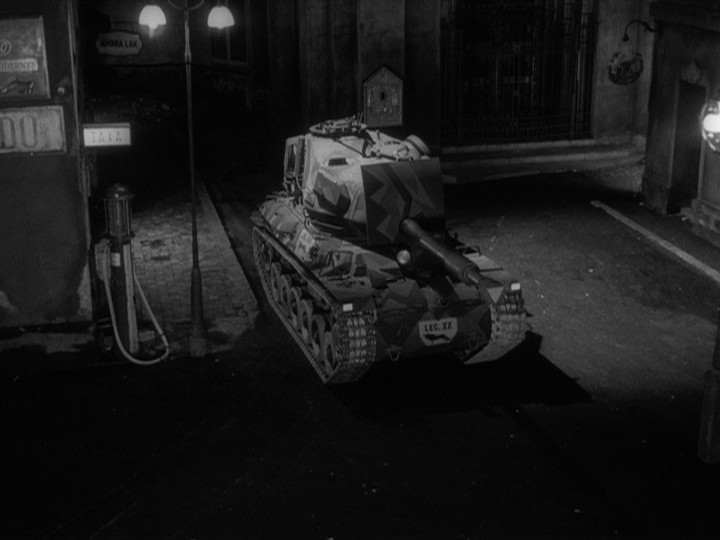
“The Silence” (still), directed by Ingmar Bergman (1963)
[Update: I posted a follow-up to this post, here.]
1.
Susan Sontag’s seminal mid-60s essay has come up several times at this site. I’ve been busy rereading it since Xmas, and want to take this chance to set down some thoughts regarding it.
2.
Obviously, whatever interpretation is, Sontag seems against it.
3.
What, then, does Sontag mean by “interpretation”? Does she mean any and all interpretation, as my fellow contributor Chris Higgs recently argued? Or something else, something more specific?
My Favorite New Movies of 2012
Here’s a roundup of my favorite newish movies, with some thoughts on each one. If you appreciate and/or doubt my taste in motion pictures, here are my lists from 2009 & 2010 & 2011. And here are some overall notes:
- Films marked with an * can be watched for free online; just click on the title.
- Roughly half of the films are from 2012; the rest hail from 2008–11. As I argued in my posts “How Many Movies Are There?” and “How Many Movies Have You Seen?“, no one can watch every new release when it comes out (especially when they’ve recently started a PhD program). I prefer to think of my lists 2009–present more as an ongoing project than as definitive statements on any given year. (I also feel free to revise my opinions over time.)
- You may find relevant two older posts—“How Many Cinemas Are There?” & “Why Do You Need So Many Cinemas?“—where I decry the habit of so many film critics to consider only feature-length theatrically-released films when making these kinds of lists. (All other cinema somehow disappears at the end of the year! Which is particularly odd at the present moment, when broadband has been revitalizing the short movie form.)
- If you want straight lists of the titles without any commentary, just skip to the end.
And now, without further to do, here are 30+ relatively-new movie-things that I saw and have thoughts on, starting with—
I. MY 10 FAVORITE NEWISH FILMS THAT I SAW THIS YEAR AND FEEL COMFORTABLE RECOMMENDING THAT OTHERS CHECK OUT
I’m sorry, Mario, but your cultural critique is in another castle: some thoughts on hipster irony
Last August I attended a live reenactment of Total Recall (the classic 1990 version, natch, not the remake). It was a deliberately shambolic affair, a loosely-focused variety show run by Everything Is Terrible and Odds N’ Ends, involving puppets, videos, intentionally bad acting, and dancing. It was, I suppose, what some would call “hip” or “ironic.”
At one point we watched a reedited version of one Total Recall‘s many chase scenes—the infamous escalator shootout where Arnold uses a bystander as a shield—now set to Drowning Pool’s “Bodies.” (You can watch the video here.) Which is about as cliched as it gets, but it totally works as comedy.
Part of what makes the video funny is that the Everything Is Terrible folks have upped the intensity of the Drowning Pool song: “Let the bodies hit the floor, let the bodies hit the floor … Oh, wait, they’re totally stepping on that dead guy’s squishy body—ick.” Here we must pause responsibly to acknowledge that Drowning Pool frontman David Williams has always stated that the song is not actually about “the violence thing,” but rather the “respect and code” of the mosh pit, or some such other bullshit. That hasn’t stopped Hollywood folk from using the song in numerous action movie trailers. Nor has it deterred legions of Drowning Pool fans from making their own YouTube versions.
In other words, the Everything Is Terrible video’s ironic effect depends on the pairing being a cliché. Like a lot of satirical and ironic art, it proceeds by imitating an otherwise naïve or sincere effect, then subverting it. (This is why “irony vs. sincerity” is often an unhelpful binary when thinking about phenomena like hipster irony or the New Sincerity; those scenes or movements aren’t strict artistic opposites, since they necessarily share a lot of their aesthetic maneuvers. Where they differ usually lies more in their degree of self-effacement, and in their authorial intention.)
Hipster irony is commonly perceived purely as dismissal: “You’re just making fun of Drowning Pool.” And there’s certainly truth in that—fuck Drowning Pool! But is that all there is? Because the EIT video, I think, and the entire Totally Recalled show, could be perceived as something more. Those behind the show, and those in attendance, I’d argue, were actually trying to appreciate “Bodies”—but in the only way they now can. Irony, in other words, allows hipster audiences to make use of material that would otherwise be off-limits to them.
It won’t surprise you that I want to turn here to Viktor Shklovsky, because he identified a concept that I think might help us. It is his concept of deterioration:
Ontology of the Cat Poet
THE BIRTH OF THE CAT POET’S CAPACITY FOR PASSION
OR, THE MAKING OF A MAN CAT OF LETTERS
Witness my house’s cat George Jackson pen his magnum opus. Below are some notes provided by Susan Sontag from her essay on Marina Tsvetaeva titled “A Poet’s Prose.”
*
Being a poet is to define oneself as, to persist (against odds) in being, only a poet.
//
Actually, the frontier between prose and poetry has become more and more permeable — unified by the ethos of maximalism characteristic of the modern artist: to create work that goes as far as it can go.
[GEORGE SAYS: “NO. POETRY IS THE HIGHEST FORM. I REFUSED TO ADMIT THE UNREFINED SCRIBBLINGS OF A NON-POET.”]
//
Homage to others is the complement to accounts of oneself: the poet is saved from vulgar egoism by the strength and purity of his or her admirations.
//
Poet’s prose is mostly about being a poet. And to write such autobiography, as to be a poet, requires a mythology of the self. The self described is the poet self, to which the daily self (and others) is often ruthlessly sacrificed. The poet self is the real self, the other one is the carrier; and when the poet self dies, the person cat dies. (To have two selves is the definition of a pathetic fate.) Much of the prose of poets—particularly in the memoiristic form—is devoted to chronicling the triumphant emergence of the poet self. (In the journal or diary, the other major genre of poet’s prose, the focus is on the gap between the poet and the daily self, and the often untriumphant transactions between the two. The diaries—for example, Baudelaire’s or Blok’s—abound with rules for protecting the poet self; desperate maxims of encouragement; accounts of dangers, discouragements, and defeats.)
//
In prose the poet is always mourning a lost Eden; asking memory to speak, or sob.
//
All of Tsvetaeva’s George’s work is an argument for rapture; and for genius, that is, for hierarchy: a poetics of the Promethean.
//
To be a poet is a state of being, elevated being: Tsvetaeva George speaks of her his love for “what is highest.”
//
There is the same quality of emotional soaring in her his prose as in her his poetry: no modern writer takes one as close to an experience of sublimity.
Art v. Politics: Not About Privilege
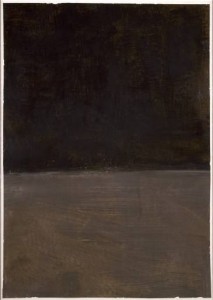 I’ve put my favorite Susan Sontag quotation in comment fields here, but I’m going to recall it again:
I’ve put my favorite Susan Sontag quotation in comment fields here, but I’m going to recall it again:
And the wisdom that becomes available over a deep, lifelong engagement with the aesthetic cannot, I venture to say, be duplicated by any other kind of seriousness. Indeed, the various definitions of beauty come at least as close to a plausible characterization of virtue, and of a fuller humanity, as the attempts to define goodness as such.
I believe this with every bit of me. And I am completely convinced that, as egregiously privileged as I am, this is not a privileged position. Susan Sontag had radical left politics, but she put the aesthetic first. She’s a lot smarter than me, but I’m still going to try to make some sense of that position here.
Politics are terminal. They are finite. We might say we are interested in raising questions when we talk about gender or race or other categories that are defined and upheld by politics. But politics is really about finding answers. This has its place, but its place is not in art.
Artists know that finding real answers is not possible in this world. The failure of politics to recognize this fact is why the lasting thing from any culture has been its expression. Desperate people turn to story, turn to verse, performance, art. When nothing is assured, when help doesn’t come, when standards aren’t met and good people suffer, the only thing left is to confront mystery, to confront tragedy and eternity.
The aesthetic means simply the representation of all this mystery, tragedy, eternity without the dissembling claim of wrapping them up neatly. Keying into the aesthetic instead of the political in a work of art is about asking what choices of form the art-maker made to best help the audience to access the mystery, the eternity. To help the audience feel human.
Critics on Criticism: Susan Sontag
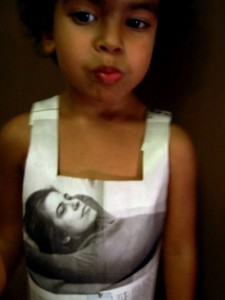 From title essay of Against Interpretation:
From title essay of Against Interpretation:
What is important now is to recover our senses. We must learn to see more, to hear more, to feel more.
Our task is not to find the maximum amount of content in a work of art, much less to squeeze more content out of the work than is already there. Our task is to cut back content so that we can see the thing at all.
The aim of all commentary on art now should be to make works of art–and, by analogy–our own experience–more, rather than less, real to us. The function of criticism should be to show how it is what it is, even that it is what it is, rather than to show what it means.
In place of hermeneutics we need an erotics of art.

